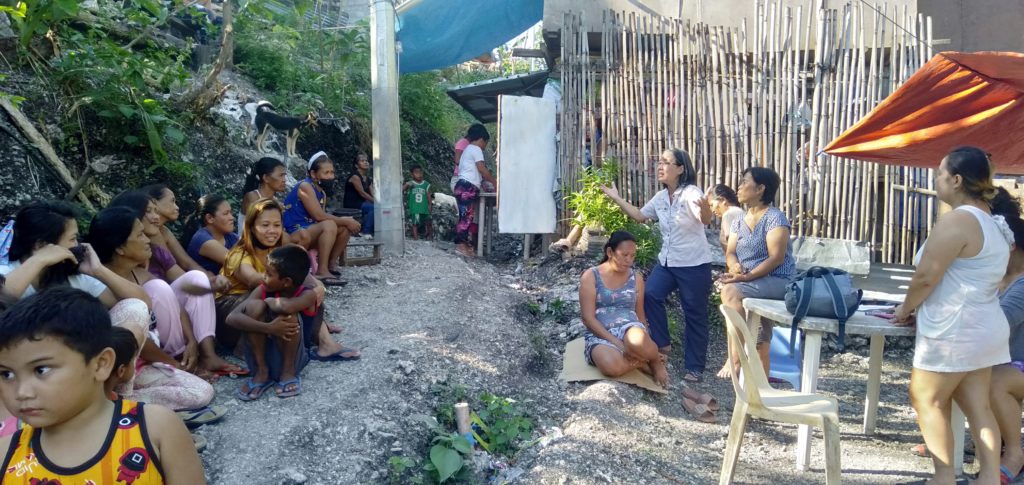Barangay Sto. Niño, San Miguel and Barangay Caluasan, Dagohoy, Bohol
April 2010 – March 2013
The Visayas Primary Health Care Services, Inc. (VPHCS), with the support of the Asian Community Trust (ACT) implemented a project “Building community-based health programs to promote health and prevent disease in Bohol” from April 2010 to March 2013.
The project areas are Barangay Sto. Nino in the Municipality of San Miguel and Barangay Caluasan in the Municipality of Dagohoy in Bohol. The communities were affected by the failure of the Malinao Dam Project which worsened their economic situation that in turn affected their health conditions. Sto. Nino has a population of 679 or 125 households while Caluasan has a population of 2,132 or 402 households.
The project worked with the farmers’ organization in Sto. Nino, the Hugpong Mag-uuma sa San Miguel (HUMASA) or the Farmers Association in San Miguel and the farmers’ organization Mga Mag-Uuma sa LACALSANDA Apektado sa Land Levelling (MALALA) (Farmers in Lacalsanda affected by Land levelling) in Caluasan.
The project equipped community health workers (CHWs) and leaders of the people’s organizations with knowledge and skills to build community based health programs which addressed the common health problems in their communities. Capacity building is a primary strategy in the project which enables the CHWs and the leaders to launch health campaigns that address the prevalence of common preventable and communicable diseases. Direct health services by project staff and volunteer health professionals also addressed the diseases in the communities.
The Asian Community Trust (ACT), Japan’s first fund raising-style charitable trust, was established in 1979 to assist people at the grass-roots level in Asian developing countries. It has supported projects in more than five Asian countries, in fields spanning health, medical treatment, education, youth training, and development of rural communities. It has funded several projects in urban poor settlers and fishermen communities in Cebu.
Health programs that answered the health needs of the communities were instituted in the project by the trained CHWs together with the leaders and members of their people’s organizations. Community participation and involvement in designing the health programs appropriate for the communities was ensured as it is a hallmark in community-based health programs and is the cornerstone in the primary health care approach of health service delivery. The health programs were based on results of surveys and key informant interviews that gathered data on the socio-demographic profile and health data including common health problems, causes of deaths, the immunization status and nutritional status of preschoolers, health services available in the community, methods of family planning and nutritional and food practices of the families.
The first year, April 2010 to March 2011 laid down the groundwork of their CBHP. Capacity building activities were conducted among leaders of the people’s organizations (PO) and community health workers (CHWs) which subsequently enabled them to provide health information and basic services to the people such as home remedies for common health complaints.
In the second year, the CHWs whose skills were further enhanced through additional trainings, guided the people to better understand about nutrition, family planning and contraception, hypertension, control of acute respiratory tract infections, and control of diarrheal diseases, among others. Trained CHWs also promoted early health seeking behavior, continued to render basic health services, and identified and referred hypertensive patients.
The second year also started a nutrition program to address the problem of malnutrition among preschoolers in both barangays.
A family planning program provided access of contraceptive commodities to benefit couples in Caluasan who desired to limit the number and space their children.
With special skills trainings, the CHWs were able to sustain their ongoing health campaigns including the nutritional rehabilitation of malnourished children, promotion of proper nutrition, family planning, control of hypertension, and provision of essential herbal and rational Western medicines.
Networking with local government officials, health center personnel and non-government agencies further enabled the people’s organizations to address the problem of the lack of medicines and essential health services and generate support for their health programs.
The third and last year further sustained the tremendous gains garnered in the first two years.
Two training centers in the barangays were built to serve as venues where medical check ups, processing of herbal medicine, ventusa, acupressure, meetings and other services are conducted by trained community health workers (CHW). Health services continue today in both barangays.
Indeed, community participation was the key through which the people led by their organizations, formulated, implemented and evaluated their respective community health plans to ensure that they truly addressed their health needs.
Even after the project has e VPHCS shall continue to assist the people’s organizations by providing monitoring and upgrading of CHW skills, assistance in their request for medical services and to sustain the services in their health centers and other health endeavors that they will launch in the future in response to their health problems.



